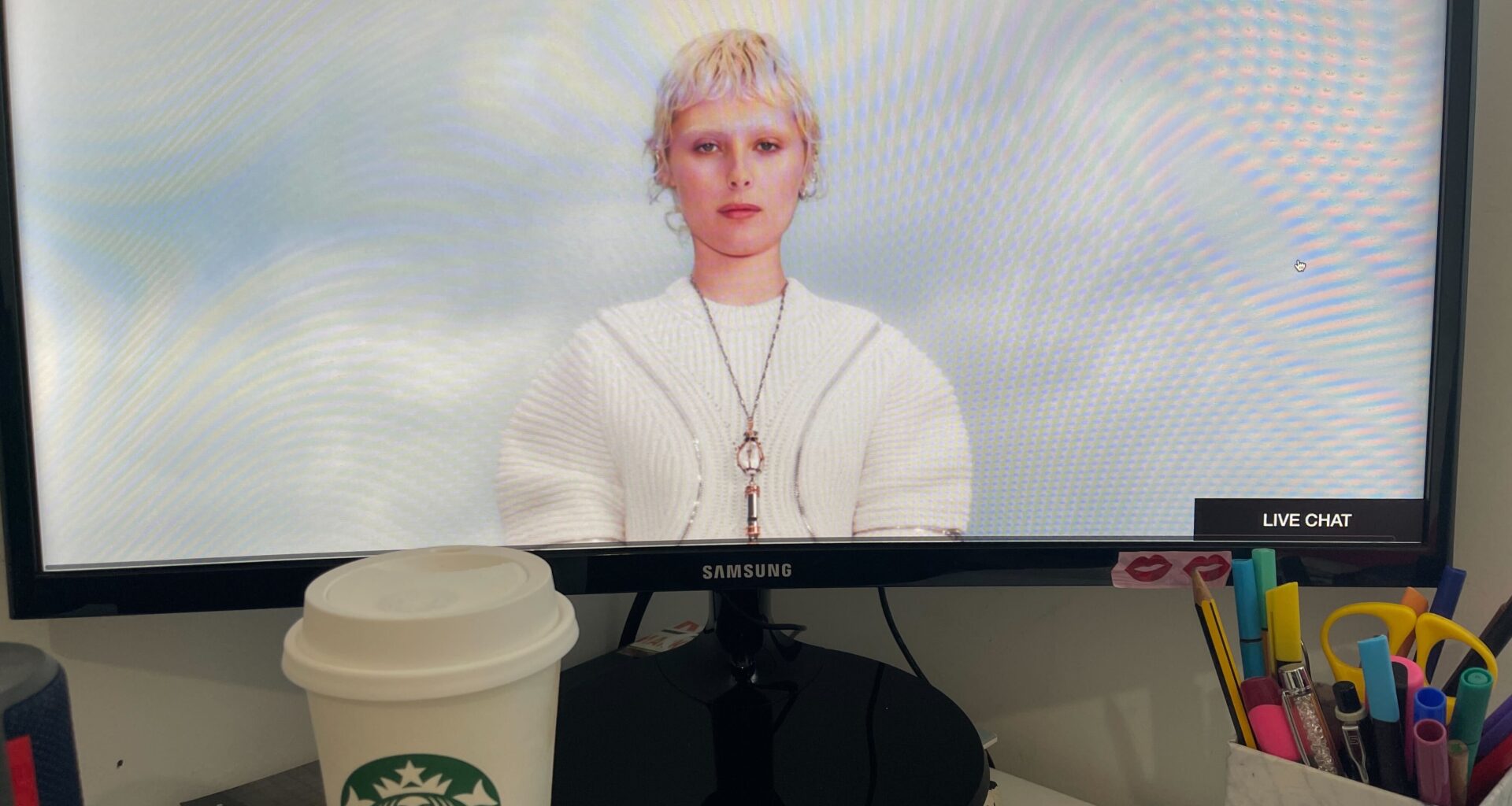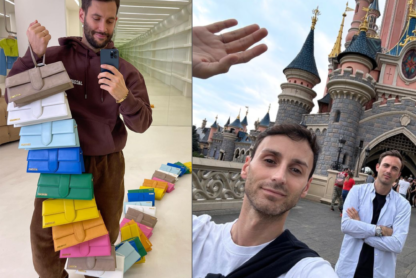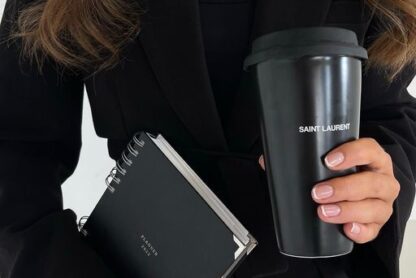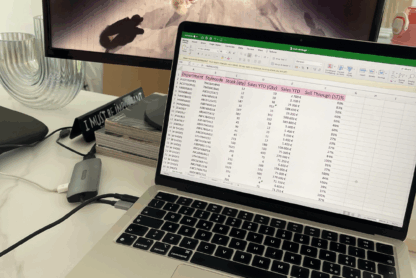Are you exploring career options in the fashion industry?
If you are interested in the digital side of fashion brands, the e-commerce role may be made for you.
Exploring careers in Fashion E-commerce: How to get started
I actually started my career in fashion at the e-commerce department of Alexander McQueen. So, there is a lot I would love to share with you about this role. It was my first fashion internship 🥹 and I am glad I chose it because I have always been fascinated by careers in the digital and e-commerce sectors.
This experience was both challenging and rewarding. I was working from the Milan offices which at that time were in the building of Bottega Veneta. Both brands are part of the Kering group that’s why the McQueen offices in Milan which has the main HQ in London, was based there at that time. In my role, I encompassed a wide variety of tasks that were essential to the brand’s online presence. I monitored daily sales and stock levels to identify bestsellers and underperforming items. It allows us to make informed decisions about our inventory. Managing the homepage content was another key responsibility. I uploaded new collections and products with each season’s launch, ensuring everything was current and appealing. I collaborated with the team to enhance user experience (UX). So, I was working to make the website easy to navigate and creating a smooth, enjoyable shopping experience for our customers.
Additionally, I conducted technical checks to ensure all links and pages were functioning properly. Also, I promptly uploading fashion show videos after Paris Fashion Week. Moreover focused on brand storytelling by updating the brand’s history and story pages, keeping the content fresh and engaging for online visitors. Lastly, I coordinated newsletters to ensure that the brand’s latest news, product launches, and special offers were delivered to subscribers in style, helping to keep our audience informed and excited.
Importance of e-commerce in the fashion industry
E-commerce in fashion refers to the selling and buying of one or multiple brands’ products online. This type of commerce has appeared with the rise of the internet. It has been growing more and more with the development of new digital technologies and consumer behaviors. According to Bain & Company, online luxury sales are set to double between 2019 and 2025. By 2025, e-commerce will likely represent 30% of total global luxury sales, up from 22% in 2020. This growth is fueled by younger, digital-native consumers who demand seamless, high-end online shopping experiences.
These changes changed significantly the way we shop. It offers an alternative to physical stores and allowing consumers to shop for fashion items from the comfort of their homes using websites or mobile apps. In addition, fashion e-commerce allows brands to reach a global audience and shipping products internationally.
In the context of thriving and growing online shopping, e-commerce is one of the most high-in-demand jobs in fashion and it’s likely to stay so as the digital realm continues to expand. This means there will be more and more job opportunities in this sector. So if you are looking for a job in fashion that is (and will remain) trendy and you see yourself working in the digital department, you should look for jobs in fashion e-commerce.
Jobs in Fashion E-commerce
I often refer to the e-commerce department as a company within the company. While you might think of fashion in terms of runway shows, design studios, and editorial shoots, behind the scenes, there is an entire department that drives the online experience, sales, and digital presence. If you’ve ever bought a luxury handbag or iconic piece from your favorite designer’s website, it was the work of an e-commerce team making it all happen seamlessly.
What is Fashion E-Commerce?
Imagine working for one of the biggest fashion houses in the world—brands like Alexander McQueen, Gucci, or Dior. Now picture their e-commerce department: it operates like its own specialized company. This division handles everything related to the brand’s online store. It ensures that products are well-presented, easy to find, and always available for purchase.
Within the e-commerce realm, there are roles just as varied and crucial as those you’d find in any fashion department. You’ll come across positions like:
- E-Commerce Stylist: Responsible for styling the products for online photoshoots. Also, the stylist ensures that the clothing or accessories look their best in the digital store.
- E-Commerce Buyer: Works with the buying team to select the right products to sell online. The e-commerce takes into account digital trends and data.
- E-Commerce Merchandiser: Focuses on the placement and availability of products on the site. The person also ensures the right inventory levels, pricing strategies, and promotional execution.
These roles might sometimes be referred to as Digital Buyer, Digital Stylist, or Digital Merchandiser, emphasizing the online nature of the job.
More of the roles are in the next section below.
It’s surprising how many people overlook the opportunities within the e-commerce department. For example, if you aspire to become a stylist, pursuing a role as an e-commerce stylist is a fantastic option. Since it’s less popular than traditional styling roles, you may find more opportunities, especially at the entry-level. Smaller brands often combine e-commerce and offline role. However, larger brands like Alexander McQueen or Gucci have specialized positions that allow you to focus solely on the digital side of fashion, creating unique styling for their online platforms.
If you’re interested in working in e-commerce, you can choose between single-brand companies like Chanel, Dior, or Prada, or online luxury retailers such as Net-a-Porter and Mytheresa. These multi-brand platforms offer a broader experience, often working with various designers and collections, which can diversify your skill set and give you exposure to the latest trends across multiple brands.
There are many different careers in fashion e-commerce, let’s explore them.
Fashion E-commerce Manager
The fashion e-commerce manager is in charge of a brand’s or retailer’s online store. On a general scale, they are in charge of managing the website and overseeing the day-to-day operations, ensuring that it runs smoothly and efficiently.
Their responsibilities often include:
- Coordinating the launch of products on the site considering the new collections and what is happening in the physical shops.
- Developing and implementing long-term e-commerce strategies that align with the fashion company’s overall business goals. This includes staying aware of trends to make the brand’s e-commerce platforms competitive, looking for opportunities to expand into new markets, determining pricing strategies, etc.
- Building vendor and partner relations, such as payment processors and delivery services, ensuring they meet the company’s standards
- Managing the e-commerce budget
- Taking care of compliance and security matters, ensuring that the e-commerce platform complies with data privacy laws and industry regulations, and implementing security measures to protect customer data and prevent breaches.
The E-commerce team works closely with other departments, such as IT, customer service, logistics and supply chain, marketing and social media, and buying and merchandising to ensure alignment and collaboration across the company.
Depending on the company, the e-commerce team can encompass one or more of those roles. In a small company, they can be responsible for managing the content, marketing, logistics, customer care, etc. at the same time. While a bigger brand can have several divisions to manage these different aspects of e-commerce. So consider this when you read about e-commerce jobs below.
E-commerce Stylist
An e-commerce stylist is the creative genius behind the looks you see in your favorite online stores from luxury and fashion brands. They carefully curate and style outfits that can make a huge difference in your shopping experience. Think about it: how often have you been tempted to buy a complete look just because of how beautifully everything was put together online? Those perfectly styled outfits not only showcase the products but also help you imagine how you can wear and enjoy them in your own life. E-commerce stylists play a big role in making those outfits irresistible, turning browsing into buying. If you have ever considered a career in styling, search for a styling internship at Net-A-Porter, MyTheresa, or your favorite fashion brand.
E-commerce Copywriter
Next to the beautiful images styled by the e-commerce stylist, online stores feature also all the descriptions of each product you are considering buying. The words are curated by the copywriter. The copywriter is the storyteller behind the scenes, bringing products to life with engaging and enticing descriptions. They write the words that help you connect with each item, highlighting its unique features, quality, and the emotions it can evoke. Think of them as the voice of the brand, using friendly and relatable language to guide you through your shopping experience. Whether it’s a captivating product description, a stylish category page, or an inspiring newsletter, copywriters ensure that every word resonates with you and makes you feel excited about your next fashion find. By weaving together the essence of the brand and the desires of customers, they play a key role in turning casual browsers into happy buyers.
E-commerce Intern
If you don’t have experience, starting with an e-commerce internship—just like I did—can be an exciting way to dive into the fashion industry! As an e-commerce intern at a luxury fashion brand, you’ll play a vital role in supporting the digital operations of the brand’s online store, where everything is focused on creating a premium experience for high-end customers. Your day-to-day tasks will involve helping with product management and uploads, which means preparing eye-catching product descriptions, ensuring the images look amazing, and organizing items into categories like new arrivals and seasonal collections. You’ll also get to analyze sales data specific to the luxury market, tracking daily revenue and monitoring conversion rates to see which products are shining and where improvements can be made.
You’ll help with digital merchandising too, making sure the right products are featured on the homepage and that everything aligns beautifully with the brand’s aesthetic. Coordinating personalized email campaigns and newsletters will allow you to maintain a close connection with clients, inviting them to exclusive online events or pre-sales. You’ll even have a hand in enhancing the website’s functionality, checking for glitches, and suggesting tweaks to improve the online shopping experience. Throughout it all, you’ll collaborate with teams like marketing, content creation, and IT, helping to deliver a seamless and luxurious experience that truly reflects the brand’s identity. It’s a fantastic opportunity to learn and grow while being part of the exciting world of luxury fashion.
Digital Content Manager
The digital content manager supervises all the content of the fashion company’s online e-commerce platforms. They curate graphics, product descriptions, newsletters, and social media posts to create a compelling and informative shopping experience.
Online/Digital/E-commerce Merchandiser
An e-commerce merchandiser at a luxury fashion brand plays a key role in shaping the brand’s digital storefront to reflect its prestigious image and drive online sales. They curate product assortments for the website, selecting which collections or pieces to feature on each page (homepage, new arrivals, occasions…) based on trends, seasonality, and brand priorities. Visual merchandising is crucial, as it ensures the digital store mirrors the luxury in-store experience by optimizing product placement, visuals, and content to create an immersive and high-end shopping environment.
Additionally, they analyze sales performance and key metrics like conversion rates to refine merchandising strategies, promoting top-performing items through the homepage, newsletters, and campaigns. E-commerce merchandisers also collaborate with various teams, such as marketing, buying, and IT, to align product launches, promotions, and site content with the brand’s overall business goals. Managing online inventory is another critical task to ensure in-demand products are available and coordinating restocks or markdowns when necessary.
E-Commerce Buyer
The online store of a brand has a different assortment and product availability compared to a store located in Milan, Paris, or London. This differentiation is the result of the specialized e-commerce buyer, who works to ensure that the online assortment meets the preferences and demands of an international audience. The e-commerce buyer carefully selects products from the collection to be available on the website for sale based on trends, sales data, and the unique shopping behaviors of online consumers. E-commerce buyers analyze trends and past sales, conduct competitor analysis, and manage stock levels.
E-commerce Supply Chain and Logistics Coordinator
In fashion e-commerce, the supply chain and logistics team plays a fundamental role in ensuring products are available on the site and ready to be packed and shipped quickly. They optimize inventory to ensure the stock levels always meet the demand, coordinate orders, shipping, and returns, and work with third-party vendors and suppliers, among other tasks.
Digital Marketing Manager
Depending on the company, the digital marketing manager can be part of the general marketing team or the e-commerce department. They oversee the company’s online presence. This includes:
- Developing and executing marketing campaigns and emails to drive traffic and sales
- Supervising campaign photoshoots
- Conducting search engine marketing (SEM) to increase visibility, traffic, and revenue to the website
- Monitoring and analyzing product site metrics (KPIs)
E-commerce Customer Service Specialist
The customer care team is the heart and soul of any luxury fashion brand’s e-commerce operation, serving as the crucial link between the brand and its customers. Their primary role is to provide exceptional support and assistance, ensuring that every interaction reflects the brand’s commitment to quality and exclusivity. This involves answering customer inquiries via various channels, such as email, phone, and live chat, and addressing questions about products, orders, and returns with warmth and expertise.
Customer care representatives are trained to handle a variety of situations, from troubleshooting order issues to offering personalized recommendations that enhance the shopping experience. They take the time to understand customer needs and preferences, fostering a sense of loyalty and trust. In the luxury sector, maintaining the brand’s exclusive reputation is paramount, so customer care teams are dedicated to delivering a seamless experience that mirrors the high standards of in-store service.
They also often gather valuable feedback from customers, providing insights that can inform product offerings and improve overall service.
As you can see, the E-commerce role represents a blend of creativity, technical skills, and business acumen but the job can be more creative or analytical depending on the tasks.
Skills needed to work in fashion e-commerce
Excel
Excel is the n#1 skill to work in fashion e-commerce, and I am going to show you why.
When I got a job interview for my e-commerce internship at Alexander McQueen, the first one was very generic but for the second step, I was asked to do a practical exercise on Excel. I didn’t expect to have this Excel test because not only was it not mentioned on the call, but it wasn’t mentioned anywhere in the job description! Plus, back then I didn’t know that all roles in fashion use Excel. So when recruiters put me in front of a laptop with an Excel sheet asking me to calculate the sell-through, I was surprised. Luckily, I knew how to use Excel from my degree as most of my classes were about Excel, numbers, and analysis. I also completed an intense course throughout university and used it while working at my parent’s company.
When I entered the office, I noticed that everyone in my team was using Excel every single day. Fashion e-commerce managers use Excel to:
- Keep track of product selections
- Manage and keep track of online sales progress
- Analyse website visitors, conversions, and performances
- Build category pages before importing them to the website
- Analyze sales, best sellers, and markets
If you are pursuing a career in fashion e-commerce and know Excel, you’ll go a long way. If you don’t know how to use this program yet and/or how it can be applied to fashion jobs, register for my free webinar where I teach 4 Excel tricks to impress fashion recruiters and your boss.
E-commerce tools and platforms
E-commerce is a highly analytical and software-oriented job, so at least a basic understanding of popular e-commerce platforms like Shopify, Magento, and WooCommerce is a must to manage product listings, orders, and customer data on these platforms. In addition, you need to be proficient in web analytics (like Google Analytics) to track and analyze website performance, customer behavior, and campaign effectiveness; UX/UI Design (Adobe XD, Figma), and basic Coding (HTML, CSS, or JavaScript).
Analytical Skills
The fashion e-commerce manager needs to be able to analyze sales data, customer behavior, and market trends to make informed decisions.
Digital Marketing Skills
Digital marketing skills in a fashion e-commerce often include:
- Knowledge of (SEO) and search engine marketing (SEM) is essential to drive traffic to the online store and improve visibility.
- Proficiency in Social Media Marketing to drive brand promotion and customer engagement.
- Email Marketing for designing and executing email campaigns, segmenting customer lists, and analyzing open and click-through rates.
Creative Skills
Depending on the specific role, your fashion e-commerce job can get creative so skills in visual merchandising and graphic design (Adobe Photoshop, Illustrator, Canva…), and an overall sense of aesthetics and attention to detail are essential to create an appealing online presence for the brand.
Writing Skills
Writing skills are necessary to create engaging and informative content that accompanies the visuals and tells more about the brand and its products. It includes product descriptions, blog and social media posts, etc.
Communication skills
Don’t underestimate the power of soft skills to work in fashion e-commerce – even though it seems a technical job at first glance. If your e-commerce job entails customer service and relationship management, you need to possess strong communication skills and have a customer-focused mindset to manage customer inquiries, complaints, and feedback effectively, ensuring a positive shopping experience.
Fashion Industry Knowledge:
Finally, it may sound obvious but if you work in fashion, you need to stay updated on industry trends. I also recommend studying deeply the brand you work for. Research the history and follow the news.
What to study to work in fashion e-commerce
What to study to work in fashion is one of the most common questions I get from aspiring professionals, and my answer is always the same no matter which career path you choose: You don’t need to attend a fashion school to work in fashion (except for fashion design as you only learn those skills there).
I got a bachelor’s in management engineering – something totally unrelated to fashion. When I deepened my wish to work in this industry, I feared I wasn’t good enough because I didn’t have a fashion degree on my resume. So I did a master’s in luxury fashion management. I enjoyed my classes and the perks that a fashion school brings you but I wish I chose it because I loved the school and the course – not because I felt like it’s the only way to get a job in fashion. So I don’t want you to make the same mistake.
Yes, knowledge of fashion is necessary but it’s something that helps you stay on track and not to feel lost in this big industry. Indeed, it’s always useful to be curious and know at least some basic things about the industry you work in – fashion, engineering, environment…. However, the things you learn at a fashion school won’t necessarily teach you HOW to do the job more than a traditional degree.
Fashion e-commerce may sound like a fashion job because it contains the word “fashion”, but when you look at the responsibilities, they are not something you necessarily learn at a fashion school.
Think about it: creating visuals or a campaign, managing the inventory, writing product descriptions, analyzing sales… these are skills you can learn at university or even by yourself.
So I always suggest – be this for e-commerce or any other job in fashion: look beyond the job title.
For E-commerce, you can consider degrees in management, marketing, business administration, communication, or related fields. These generic degrees teach you transferable skills that you can apply for fashion e-commerce jobs.
Some roles in fashion e-commerce may also require specialized training in web development, graphic design, or data analytics. If you still feel like don’t have enough technical skills for this job, my advice is to take short online courses. For example, you can get a certification in Google Analytics, User Experience (UX) design, Search Engine Optimization (SEO) and Search Engine Marketing (SEM), Content Management Systems (CMS), etc.
How to build a career in fashion e-commerce
Start with e-commerce internships
If you are like me 10 years ago, dreaming of getting a job in fashion e-commerce, and you have no or little experience, I suggest you follow my path and start with an e-commerce internship.
No matter what job in fashion e-commerce you are interested in, there is an internship out there for you. There are many e-commerce internships you can spot by the title.
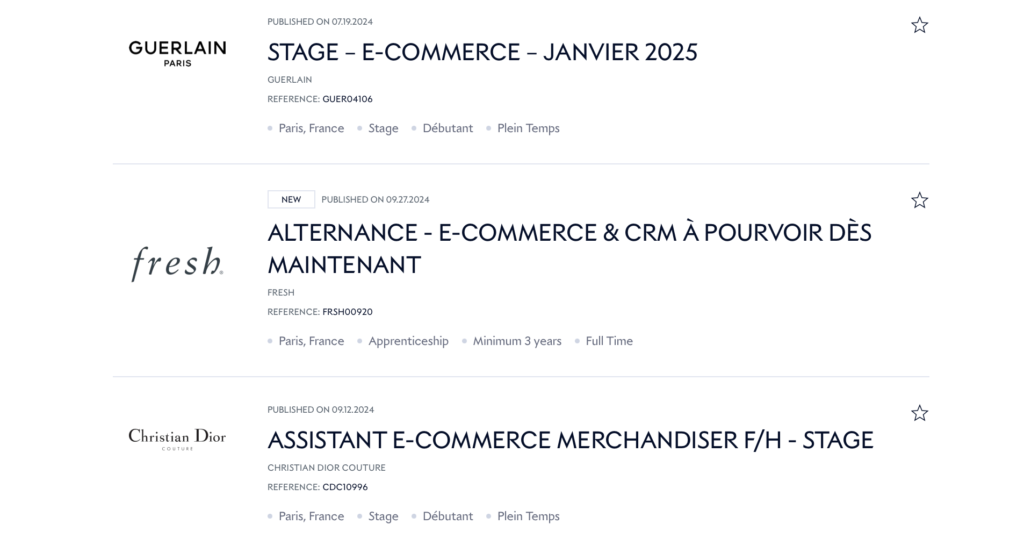
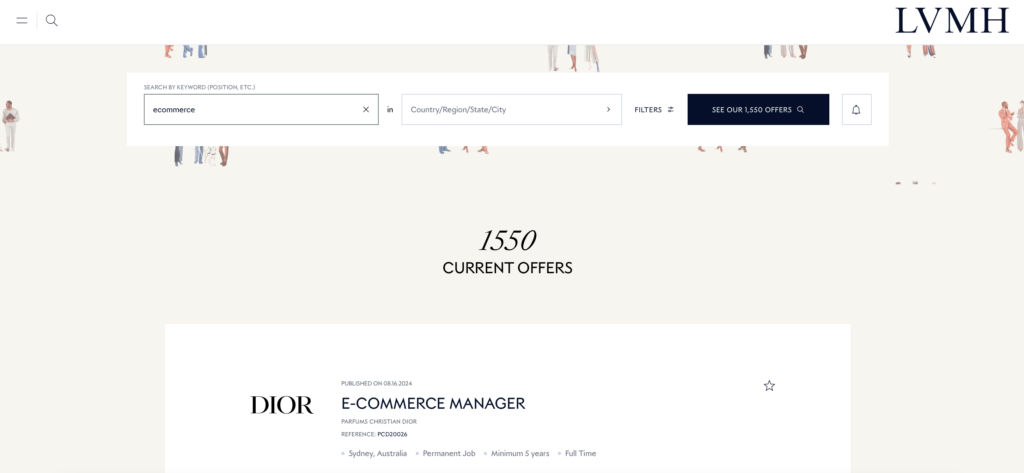
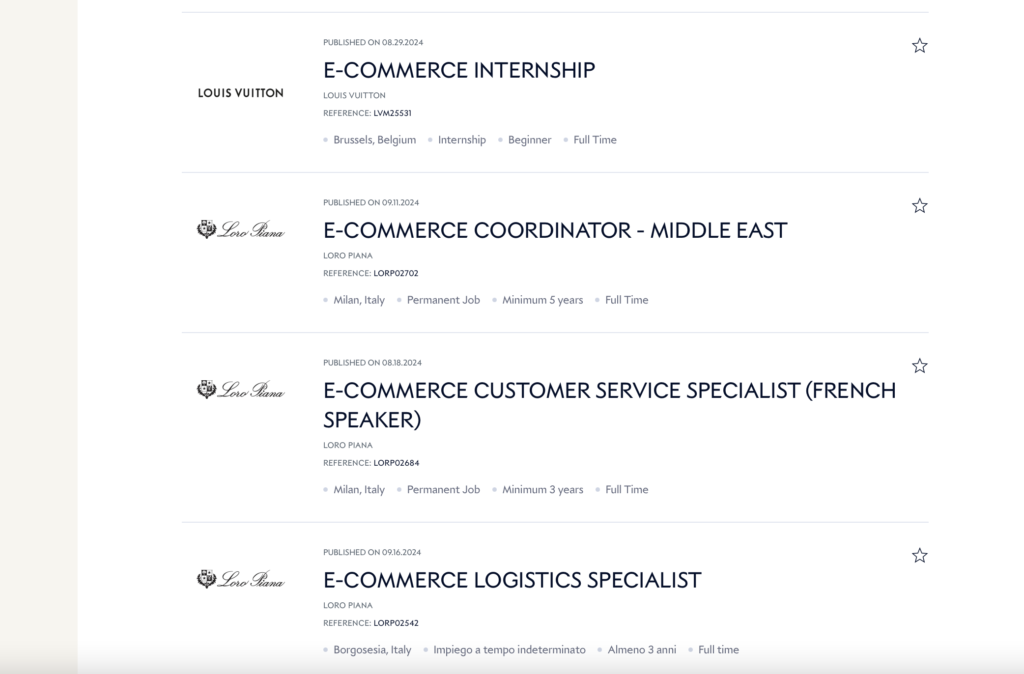
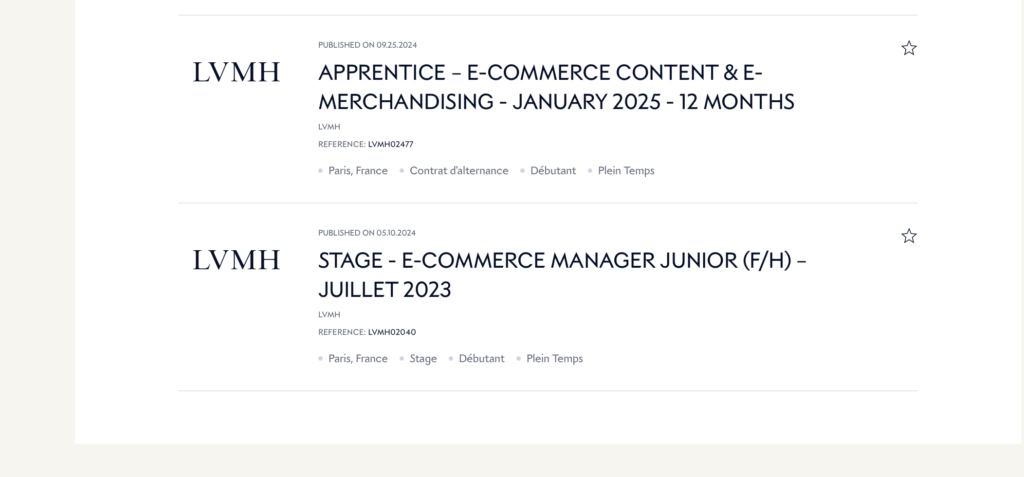

Where to find fashion jobs
The official way to find internship opportunities is by visiting the official website of the fashion brand, Group, or retailer to see if they have any open vacancies. Another option is LinkedIn, which is the most popular and best social media platform for looking for fashion jobs.
There is also an unconventional strategy, which is my favorite, to land an internship: emailing the companies directly. Don’t waste your time by waiting for brands to post buying jobs online. Be proactive and cold-email them instead and submit a spontaneous application with a strong resume, a customized cover letter, and a portfolio where you can show your analytical and creative skills needed in an e-commerce job.
I hope this material was insightful and will help you to build a thriving career in fashion e-commerce just like it was for me.
If you want to learn the strategies to break into fashion, take my online course or register for my free webinar first. Follow us on Instagram!



